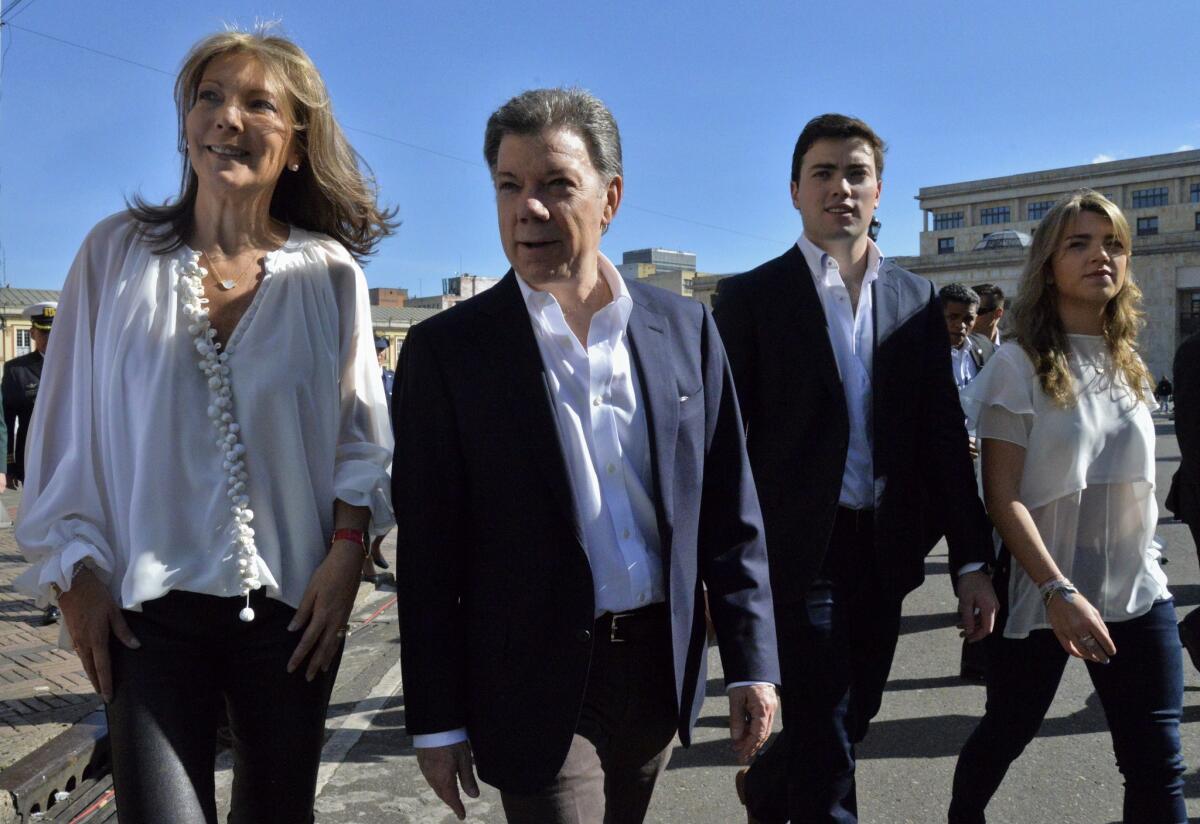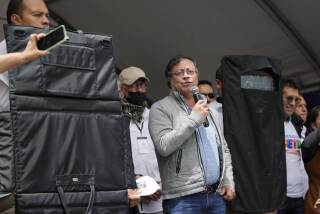Smooth voting in Colombia after mudslinging presidential campaign

- Share via
Reporting from Bogota, Colombia — Voting is underway in the first round of Colombia’s presidential elections, with centrist incumbent President Juan Manuel Santos and right-of-center challenger Oscar Ivan Zuluaga expected to emerge as the top two vote-getters and advance to a June 15 runoff.
The defense ministry said voting was proceeding without major incident Sunday morning and that 400,000 police and soldiers were deployed to ensure public safety.
A big issue for 33 million eligible voters is the Havana peace talks with leftist rebels, touted by Santos as the key to ending 50 years of civil conflict and ensuring Colombia’s future prosperity. But the talks with the FARC rebel group have dragged on longer than promised and many Colombians oppose giving rebel leaders impunity for past crimes and seats in congress, which likely would be conditions of any peace deal.
After initially saying he would stop the peace talks if elected, Zuluaga, the former finance minister, now says he would merely declare a pause in negotiations to assess them. Earlier this month, government and rebel negotiators announced they had agreed on ways to end the FARC’s involvement in drug trafficking, the third of five main peace negotiating points.
The voting is also a referendum on the performance of Santos. Despite a thriving economy and the solid backing of most of Colombia’s media (his family formerly owned El Tiempo, the nation’s most influential newspaper), he has failed to connect with the majority of Colombians, said political science professor Arlene Tickner.
Santos’ poll numbers have hovered below the 30% approval range in recent weeks as opponents’ have risen, according to samplings published this month by Semana magazine. No candidate is expected to get the 50% plus one vote needed to win the presidency outright.
Although Santos and Zuluaga are favored to pass to the second round, the exceptionally dirty campaign has been marked by scandalous disclosures that cast doubts about how the balloting will go. Voters are choosing among Santos, Zuluaga, former Defense Minister Marta Lucia Ramirez and two former mayors of Bogota, the capital, Enrique Penalosa and Clara Lopez.
Final polls earlier this month showed Santos and Zuluaga in a dead heat, with about 28% of voter preference each. But that sampling took place before the disclosure a week ago of a video purporting to show Zuluaga in the company of an alleged hacker who is said to have broken into the emails of Santos and peace negotiators.
Earlier this month, Santos faced accusations that, according to testimony of an extradited drug baron, one of his campaign officials had accepted an offer of $12 million from a group of drug traffickers as part of an alleged surrender deal.
Santos denied the charges, which have been voiced by his one-time boss and now implacable enemy, former President Alvaro Uribe, who said the Santos campaign kept $2 million of the money.
Santos said this week he would take Uribe to court over the allegations.
Colombians’ lack of enthusiasm for Santos, whom many Colombians perceive as a member of the economic elite, comes despite an economy that is one of the best performing in Latin America, said University of Miami professor Bruce Bagley. Colombia’s output of goods and services could grow by 4.7% this year, according to some estimates, better than the 2.7% growth forecast by the United Nations for Latin America and the Caribbean as a whole.
Kraul is a special correspondent.
More to Read
Sign up for Essential California
The most important California stories and recommendations in your inbox every morning.
You may occasionally receive promotional content from the Los Angeles Times.













